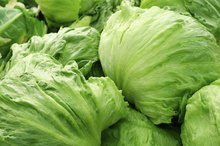Vitamins and Minerals You Can Get From Tomatoes
Although many people consider tomatoes to be vegetables, technically they are fruits. The best descriptor of tomatoes is that they are diverse, which describes their color, flavor, use and nutrients. Tomatoes can be red, orange, yellow, green or purple. You can eat tomatoes raw or baked, broiled, roasted, boiled or stewed. They are common ingredients in a variety of dishes such as sauces, casseroles, salads and side dishes. They add flavor to many meals while also supplying your body with numerous nutrients.
Vitamin C for Your Cells
Ascorbic acid -- more commonly known as vitamin C -- is a water-soluble vitamin that plays an essential role in mineral metabolism and cellular functions. Vitamin C acts as an antioxidant and prevents cells from oxidative damage. It also is important for proper lung function and immunity. One cup of grape tomatoes provides 20 milligrams of vitamin C, which make up 27 and 33 percent of the daily requirement for adult men and women, respectively. Grape tomatoes are low in calories, are sweet and are a perfect combination for healthy snacking.
Vitamin A for Your Vision
Nutrition Value of Heirloom Tomatoes
Learn More
Vitamin A is a fat-soluble vitamin that’s vital for vision and cell development. Vitamin A collectively refers to three preformed compounds found in animal products called retinoids. Plants contain carotenoids, which are a group of compounds that the body can convert to retinoids. A medium tomato contains approximately 1025 IUs, or international units, of vitamin A, which is at least one-third of the daily recommendation for adults. Topping a salad or sandwich with a tomato is a great way to incorporate this nutrient-dense food.
Potassium Is Good in Many Ways
Potassium is an electrolyte and a mineral that's essential for the body to function normally. It aids cell and tissue growth, communication between nerves and muscles and water balance. Potassium also plays a role in the movement of nutrients and wastes into and out of cells. Tomatoes and tomato products are considered very good sources of potassium. A half-cup serving of tomato sauce provides 405 milligrams of potassium, which is just less than 10 percent of an adult's daily requirement. A quarter cup of tomato paste provides 665 milligrams of potassium, or 14 percent of the daily requirement.
Other Nutrients
Butternut Squash Nutrition
Learn More
Tomatoes are good sources of many other nutrients, in particular vitamin K and manganese. Vitamin K is important for bone formation and blood clotting. Manganese is a trace element and mineral, and is required in small amounts but is essential for metabolism, tissue formation and reproduction. A medium tomato provides 5 to 10 percent of an adult's daily requirements for these nutrients.
Related Articles
Writer Bio
Dr. Tricia Psota is a registered dietitian and nutrition expert based in Washington, D.C. She has been featured on the "Dr. Steve Show" and "RadioMD" as well as in "Consumer Reports - Health." She regularly writes health and wellness articles, has co-authored five book chapters, and has been published in top-notch, peer-reviewed scientific journals. She holds a doctorate in nutrition from the Pennsylvania State University.









